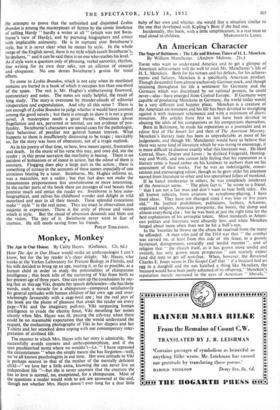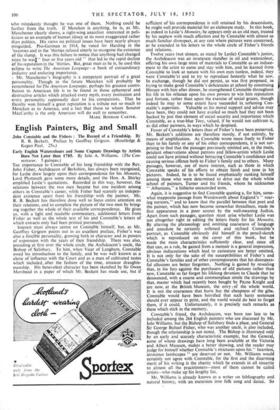An American Character
THOSE who want to understand America and to get a glimpse of American achievement will do well to read Mr. Manchester's life of H. L. Mencken. Both for his virtues and his defects, for his achieve- ments and failures, Mencken is a specifically American product. Though descended from almost exclusively German stock, and though retaining throughout his life a sentiment for Germany and the Germans which was disciplined by no rational process, he could never—alas—have emerged from Central Europe. If Germany were capable of producing Menckens in Germany, the world today would be a very different and happier place. Mencken is a creature of the American environment and his life has been devoted to inveighing against it with incessant vehemence and with a minimum of discri- mination. His articles from first to last have been devoted to abusing the idols of his compatriots or his compatriots themselves.
Born in Baltimore, he made his reputation as a journalist and as editor first of The Smart Set and then of The American Mercury. Mencken's literary taste has been as unpredictable as most of his judgements, and though Mr. Manchester would have us believe that there was some kind of literature which he was trying to encourage, it is more difficult to discover exactly what this literature was. He liked Conrad, Shaw, Dreiser and Lewis ; he disliked Fitzgerald, Heming- way and Wolfe, and one cannot help feeling that his reputation as a literary critic is based.rather on his kindness to authors than on his assessment of their works. For he was an indefatigable, consci- entious and encouraging editor, though as he grew older his attention moved from literature to other and less specialised follies of mankind.
If he hated intolerance in others, he was completely intolerant of the American scene. " The plain fact is," he wrote to a friend, "that I am not a fair man and don't want to hear both sides. On all known subjects, from aviation to xylophone-playing, I have fixed ideas. They have not changed since I was four or five years old." He loathed prohibition, politicians, farmers, Arkansas, organised religion, American prosperity, the boom, the slump and almost everything else ; but he was born at just the right time for the best exploitation of his antiseptic talent. Most standards in Ameri- can politics and literature were absurdly low, and when Mencken lunged about more often than not he hit a bull's eye. In the 'twenties he throve on the abuse he received from the many he offended. A man who said of the 1914 war that "the combat was carried on, at least from this side of the fence, in a grossly hysterical, disingenuous, cowardly and sordid manner ", and of religion that " the church itself, as it has grown more sordid and swinish, has only grown more prosperous" can scarcely expect (and did not) to get off scot-free. When, however, the Reverend Charles E. Jones wrote in The Gospel Call that" if a buzzard laid an egg in a dunghill and the sun hatched a thing like Mencken, the buzzard would have been justly ashamed of its offspring," Mencken's reputation merely increased in the eyes of American " liberals," who mistakenly thought he was one of them. Nothing could be further from the truth. If Mencken is anything, he is, as Mr. Manchester clearly shows, a right-wing anarchist interested in poli- ticians as an example of human idiocy at its most exaggerated rather than politics. His views on political issues have been nearly always misguided. Pro-German in 1914, he voted for Harding in the 'twenties and in the 'thirties refused utterly to recognise the existence of the slump. It was this failure to notice that anything had changed since he was]" four or five years old " that led to the rapid decline of his reputation in the 'thirties. But, great man as he is, he used this eclipse to write The American Language—a book of extraordinary industry and enduring importance. rt Mr. Manchester's biography is a competent portrait of a great personality. Though in the future Mencken will probably be remembered for The American Language, perhaps his greatest contri- bution to American life is to be found in those ephemeral and destructive articles which attacked every myth, every institution and every personality supposedly dear to his compatriots. That he thereby won himself a great reputation is a tribute not so much to Mencken as to America, and a fact that those to whom Senator MacCarthy is the only American will do well to remember. MARK BONHAM CARTER.



































 Previous page
Previous page